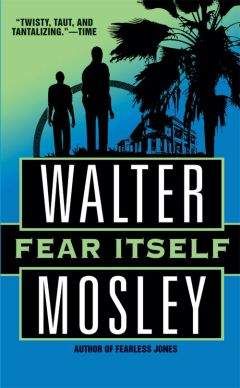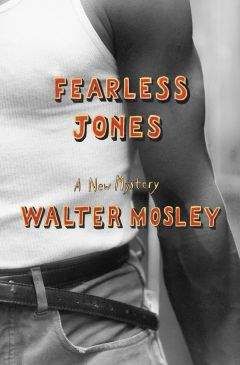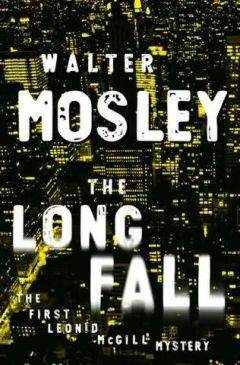Walter Mosley - The Last Days of Ptolemy Grey
“He ain’t no preacher,” Peter said. “My grandfather named him that so if you used his first name you had to respect him anyway.”
With his full strength Ptolemy swung down on the big plastic tarp covering Sensia’s room. The triple hook sunk deep. Using both hands, the ninety-one-year-old man began to pull. At first there was no give. It was as if he were pulling on the knob of a locked door. But Ptolemy Grey would not give up. He twisted his shoulders for torque, let his weight work against the heft of the covering. He pulled and yanked and tugged in staccato snatches.
All the while there was a symphony playing and a sports report spouting meaningless numbers and names.
Ptolemy didn’t listen. He went down to his knees, using all the strength in his spindly shoulders. He was about to take a rest when the plastic sheet begin to give. He stood up and away from the door, using both his strength and weight, and the tarp began to flow outward from the long-abandoned room.
The dry plastic gushed into the crowded living room like a huge reptilian tongue. Ptolemy pulled the hook out and sank it in again, dragging more of the gray sheet from the bedroom.
Again and again he dug his fang-shaped hook into the tarp, the plastic hissing like lizard skin against itself and along the floor. Ptolemy, sweating and laughing, his heart beating fast, pulled the entire covering from the bedroom. He fell to the floor under the mist of dust that had been raised. He hacked and laughed, sneezed and chuckled, rubbed his irritated eyes and tittered to himself.
“I did it,” he announced triumphantly. “I pulled that bastard outta there.”
For a while Ptolemy Grey lay there, half on the floor and half on the dusty gray tarp. He was breathing hard and laughing to himself, remembering people and things randomly, haphazardly. There was the time he and Keith Low shoveled coal on a steam train from Jackson to Memphis to pay their fare.
After Coydog had died Pity stayed in bed for two weeks. Sheriff Walters had come to ask Li’l Pea what he knew, but he didn’t say anything except that he didn’t know anything. It was all he could do to keep from crying while looking at the ugly blue veins that crossed back and forth over the sheriff’s nose.
“You know that I’m here to find them that killed your uncle, now, don’t ya, boy?” the middle-aged, portly white man asked.
“Yessuh.”
“You know that it’s crime to lynch a man no mattah what color he is?”
“Yessuh,” Ptolemy remembered saying while he caught his breath on the dirty floor, half on and half off the gray tarp.
“All you gots to do is tell me who did it and I won’t tell nobody you did.”
Walters had closed the door to Ptolemy’s back bedroom but the boy knew that his father and mother were on the other side with his sisters and little brother.
“I don’t know nuthin’, Sheriff Walters,” Ptolemy said.
“Then why you snivelin’ an’ lookin’ at the floor?”
“Because my friend is daid, suh. He daid an’ he was the person I loved the most in the whole world.”
Ptolemy got to his feet in his apartment on La Jolla Place across the street from the laundry and Chow Fun’s Chinese restaurant and takeout. The tears falling from his eyes onto the plastic tarp sounded like solitary raindrops on a lonely dark afternoon.
Moving toward the door, he saw the piles of clothes and photo albums, chairs, rolled-up sheets, covers, and carpets; there were broken straw baskets and suitcases, paperback books tied into bundles, bottles, dirty silk flowers, paintings, balls of twine, tape, and packages that had never been opened. Over it all swarmed insects of various kinds. Ants, silverfish, roaches, beetles, spiders, and even a few flying bugs. A mouse or two leaped from box to bed or floor to basket.
A fast piano piece was playing and 111 people had died in Baghdad. Ptolemy remembered Coydog telling about Ali Baba and the Forty Thieves, and then he remembered the old man with a noose around his neck, standing on tiptoes on a wooden box that wasn’t tall enough to keep him from choking a little; and all the white men and boys standing around, laughing; and then the man pouring kerosene on Coy’s feet and lighting it so that the old man couldn’t stand still to keep from hanging himself; and then Coy dancing in the air, his feet and pants on fire and all the white people laughing. Coy’s head moved from side to side and his tongue stuck out like he had something caught in his throat that he was trying to cough up.
Li’l Pea looked away.
Ptolemy slammed the door on the teeming, swarming insects and rodents. He pressed the edges on the tarp against the gap at the bottom so that the bugs couldn’t get into the rest of the house. Then he went into the bathroom, closed the door, pressed towels into the cracks, and turned the lights on. He filled the tub with hot water and stood at the ready to throw it on bugs or lynchers or ghosts if they should come.
Ptolemy didn’t know how much time had passed. Robyn had wound his clock and it was the kind that you had to prime only once every two weeks. The right time was just on the other side of the bathroom door, but Ptolemy couldn’t bring himself to go out there. All his worst memories were out there: Sensie dead and her grave covered with maggots and worms. Now all he had was the dripping water of the bathroom sink to count the time away. He sat on the floor, watching the towels, to be sure that no maggot or worm found its way to him the way his father said that the worms made their ways into Coydog’s eyes after his brother, Lupo, had cut him down and buried him in a pauper’s grave behind the barbershop without even a stone to mark his passage.
He sat upon the tile floor, counting the drips and thinking about Reggie and Coy; both men lynched and buried and made food for bugs.
Whenever Ptolemy got hungry he would drink from the faucet. After a while the hunger went away. Through the door he could hear soft music and voices that he couldn’t understand. Underneath these calming sounds he thought he could make out the scuttling of bugs and the titter of rats. If he paid too much attention to these noises his heart pumped harder and his head got light. Sometimes, when he got too frightened, he’d fall asleep and then wake up from a dream with imagined worms trying to crawl their way into his tightly shut eyes.
Ptolemy had no idea how much time had passed. He sat in the bright room listening, feeling light-headed now and again, and drinking water to kill his hunger pangs. The classical music was broken, tinkly. The news reporters made no sense. Reggie and Coydog were dead, and that girl would never find her way to him.
“You ain’t got to be afraid’a nuthin’, boy,” Coydog would tell him. “We all gonna die. We all gonna get some hurt. I mean, when a woman bring a child outta her big belly it hurt like a bastid. But that girl ain’t nevah been happier than when she hurt like that.”
“Why she be so happy?” Li’l Pea asked.
“’Cause she know that baby gonna be the love of her life, and that would be worf ten times the pain.”
At first Ptolemy was soothed when he thought about his old friend and mentor. But then his thoughts drifted back to that last fiery dance, and then to little Maude Petit. And when he thought about his loved ones being lost to fire his heart thundered and he fell asleep to dream the dreams of the dead.
Papa Grey?” a voice called.
Ptolemy was in his coffin. It was pitch black and the worms were wriggling between his fingers and toes. He opened his eyes, expecting to see nothing, but instead he found himself in the white bathtub under brilliant light. Someone was knocking at the bathroom door.
He remembered draining the tub and lying down in it the way Reggie was laid to rest in his pine box.
“Papa Grey?” she called again.
“Who is it?”
“It’s Robyn, Papa Grey. I took the keys to your front do’ but the bathroom do’ don’t have a key.”
“Robyn?”
“Yeah. Open the do’,” she said.
The old man fumbled with the lock for a minute or more. He panicked once or twice, fearing that he was locked in, but he got the door open at last. Robyn was standing there in dark-blue jeans and a light-blue T-shirt. There was a yellow ribbon in her hair and big bone-white earrings dangled on either side of her jaw.
“I died,” Ptolemy Grey said. “I died and was in my grave with worms and Coydog McCann. I was dead and gone like Sensie and Reggie and other names that I cain’t even remembah no mo’.”
Robyn put her arms around Ptolemy’s neck.
“It was a dream,” she said, cocking her head to the side and humming with the words.
“No, no, no,” he said, pushing his savior away. “It wasn’t no dream. Come on out here in the room and I can prove it to ya.”
“What’s this big plastic sheet out here, Uncle?” she asked. “It’s dirty.”
“It don’t mattah,” he said. “Just push it aside and, and, and pull up some chairs.”
Robyn did as he requested, frowning at the dust rising from the faded tarp. She sneezed and got his stool and her lawn chair set up in front of the door.
“Mr. Grey, can I turn off the TV and the radio so I can hear you?”
“Sure. I don’t care,” he said.
They sat down facing each other. Ptolemy’s eyes were bright. There was a grin on his face. He took the child’s left hand in his and gazed deeply, even thoughtfully, into her eyes.
Robyn stared back, seeing a face that she knew with a different man inside.
“Some things,” Ptolemy said. “Some things is in the world and in our hearts at the same time.”
He went silent, waiting for more words to come, the words and the ideas behind them that were coming slowly but steadily from his mind.
Robyn nodded, her head like a pump priming a well.
“I had a tarp,” Ptolemy said, “this one right here, over all the things in my bedroom. All the books and carpets and clothes and glass jewelry. That was Sensia’s room, the wife that I loved the most ...”
Pitypapa Grey was aware of the silence in the room. The music had been hushed and the men and women talking about crime and killing were quiet at last. It occurred to him that before now, before this moment, the content of his mind was the radio and the TV, that he was just as empty as an old cracked pecan shell—the meat dried up and crumbled away.
“Papa Grey?” Robyn asked.
“Yeah, baby?”
“You just sittin’ there.”
“What was I sayin’?”
“That some things is in the world and in our hearts at the same time.”
He looked at her lovely young face and let the words wash over his parched mind.
“Yeah,” he said with a smile. “That tarp. That tarp was like the pall in my mind.”
“The what?”
“The pall. It’s a shroud what undertakers put over the dead until they get put in the coffin.”
“And this plastic sheet is like that?” Robyn asked.
“It was over that room, and at the same time it was in my head, coverin’ up all the things that I done forgot, or forgot me.”
The idea turned in on itself and Ptolemy lost his way. He brought his hands to his head and tried to remember. It was all there but not quite clear. Things jumbled together: Coydog’s funeral next to Artie and Letisha; the iron-banded oak box with its treasures and promises, its curses and death—hidden but still a danger; Reggie laughing and eating french fries in the sunlight through the restaurant window.
Robyn took his hands from his face.
“Look at me, Mr. Grey,” she said.
There were tears in his eyes.
“I got to get my thoughts straight, girl. I got to do sumpin’ before that damn pall is th’owed ovah me.”
“When’s the last time you et?” she asked.
Ptolemy understood the question but the answer was the white tail of a deer flitting through the trees. He shook his head and wondered.
“First thing we gotta do is get you sumpin’ to eat, Uncle,” she said.
“I had a can’a tuna day before, day before yesterday.”
The cheeseburger tasted good, better than any food he’d had in a very long time. They sat in the window seat at the fast-food restaurant, watching the black people and brown people walking up and down the sidewalk, driving up and down the street. The faces didn’t confuse him anymore but he was still confused. Not so much that he’d get lost in Coydog’s lessons down near the mouth of the Tickle River, where they had alligators that would carry off little boys and girls sometimes. He’d remember the purple skies of fall evenings without getting inside them, but he couldn’t recall where he’d put the treasure; he couldn’t put words to the one lesson that Coydog taught that he needed to know.
“What you do in school?” Ptolemy asked Robyn.
“I’m not in school right now, Uncle.”
“I know. I know that. I mean, what you gonna do when you go back again?”
“Maybe be a nurse or a schoolteacher.”
“Why not a doctor?” the old man asked.
Robyn stared at her newly adopted relative.
“Bein’ a nurse is good,” she said.
“A doctor is a king and the nurse is like the five of hearts. You at least a queen, Reggie, I mean Robyn. I’m sorry.”
“Don’t be sorry,” she said.
Robyn put her fingers on his forearm. “We got to bomb your house, Uncle,” she said.
That day they went to the bank to cash two checks that Ptolemy had received in the mail. The old man was looking from face to face, examining each one.
“You lookin’ for somebody, Uncle?”
“Double-u ara eye en gee,” he said.
“What?”
“Double-u ara eye en gee. That’s a friend’a mines.”
“If you say so.”
They bought groceries at Big City and insect bombs at Harold and Rod Hardware. There were seven of them like Roman candles held up by Popsicle-stick crosses, which were bonded by rough dabs of white glue.
“You only need one for every one and a half rooms in the house,” the salesman told Robyn.
He was a redheaded young black man with pinkish-brown skin and big brown freckles. Ptolemy wondered how many white men had been that boy’s forefathers. This seemed very important to him, but then the thought got lost in the young people’s conversation.
“How long before we can go back in?” Robyn asked.
“Twenty-four hours, no matter what,” he said. “Then you go in an’ open the windahs, let it air out a hour or two and it’a be fine.”
“You got windahs, Mr. Grey?” the girl asked.
“Out on the back porch. Sensie an’ me’d open the back windahs and the front do’ in summah an’ it was bettah than air conditionin’.”
“What’s your name?” the freckled clerk asked Robyn.
“Chili Norman,” she said easily. “I live in that green house ovah on Morton.”
“You gotta phone?”
“Uh-uh,” she said coyly. Smiling as she did so. “I’ll take two’a those little electric fans you got on sale. And I’ma need some wide tape too.”



